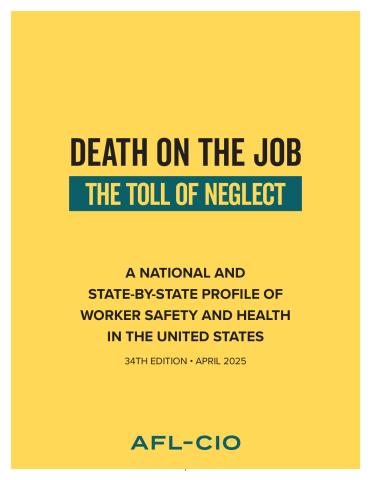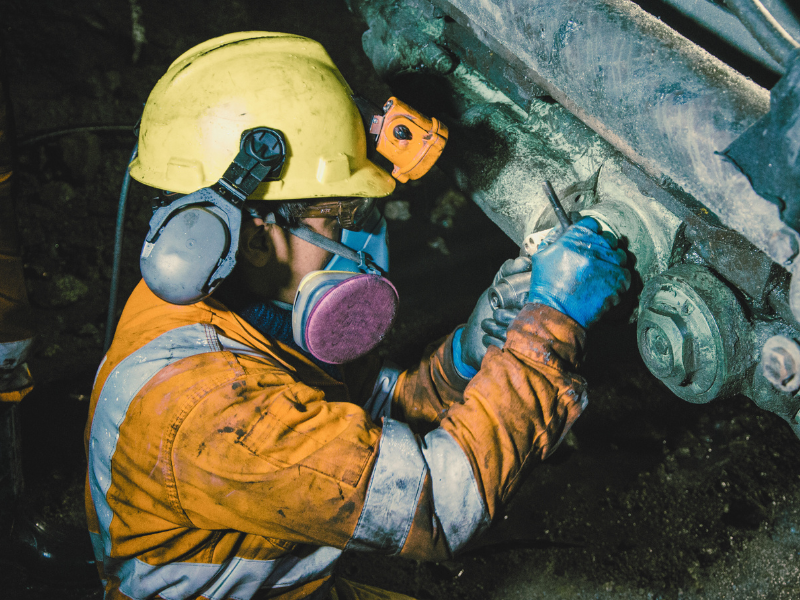Secretary-Treasurer Fred Redmond delivered the following remarks as prepared at the Allegheny County Workers' Memorial Day event:
Thank you Darrin [Kelly] and the Workers' Memorial Planning Committee for including me here today.
It’s a privilege to be joining you for Workers Memorial Day as we mourn the friends, family and colleagues we lost over this past year – here in Allegheny County and across America.
The best way we can honor those we’ve lost – and keep their memories alive – is by having the resolve and determination to make our workplaces safer – for us, for our children and grandchildren.
This is work we must commit to, because workplace injuries and illnesses and deaths are preventable. Everyone should be able to work their shift free from environmental hazards that cause disease. And everyone should be able to come home after their shift free from injury.
But not all workers have that right. Some employers are not committed to the health and safety of their workers.
The pandemic made that crystal clear. Workplaces were a main source of COVID-19 outbreaks. People were infected as they worked without access to proper ventilation and personal protective equipment.
And when the Trump administration stood around with their hands in their pockets and failed to take action, we came together – workers and their unions – to demand access to the measures to protect us from inhaling the virus at work.
We used our collective voice to advocate for laws and regulations that help protect workers. We won protections in states and we held our leaders accountable.
We organized for safe jobs because we know progress doesn’t just happen on its own. We make progress happen. That’s what we’ve always done.
Here in Pennsylvania, mine explosions used to be a common occurrence.
In 1904, just down the road in Cheswick, some 200 miners were killed in a horrific explosion at the Harwick mine.
In December 1907, 239 coal miners were killed in a mine explosion in Westmoreland County. They were among the 3,000 coal mining fatalities in that month alone.
And 100 years ago this November, some 60 miles northeast of here in Cambria County, a coal mine explosion killed 79 people. Those 79 deaths were preventable. The mine had been rated gaseous and miners had been burned by gas on several occasions, but the new mining company insisted the mine was safe.
The industry saw tragedy after tragedy. And these deaths started to become commonplace. Coal miners – many of them immigrants – paid with their lives to power the country.
It wasn’t until workers came together, to fight in one voice for better standards and safer jobs that things changed.
Thanks to them, job safety has improved. Not only in mines but in pretty much every other industry.
Advancements in protective equipment and materials and technology have played a big part, that’s true. But unions were critical to having these new life-saving measures applied to protect workers.
Unions also advocated for shorter work days and regular breaks to stave off the fatigue that we know can lead to tragic accidents.
Working people are the major reason workplace fatalities and long-term environmental hazards have dropped so drastically.
Our commitment to worker safety is in our DNA. When we come together we can advocate for laws and regulations that help keep us safe on the job.
And we have to continue that work. Because even one death on the job is one too many.
Here in Pennsylvania, 148 workers were killed on the job in 2020. And that number from the Department of Labor does not include the thousands who died from being exposed to COVID-19 at work.
We mourn their deaths, and as Mother Jones said, we fight like hell for the living.
Because workers continue to be exposed to extreme heat and extreme weather – to toxic chemicals and combustible dust – to viruses and diseases – and so many more unsafe working conditions.
And while death is equal in the end, the risk is not. People of color are more likely to die on the job. The fatality rate for Black and Latino workers continues to be greater than the national average. And nearly two out of three Latinos who died on the job were immigrants.
Now look, it’s the employer’s responsibility to provide workers a safe workplace. But we as unions can help hold the employer accountable. Workers in a union have a voice at the table on safety, and on scheduling and safe staffing levels.
That’s a fact. A recent study found that union workers in nursing homes had lower COVID infection rates, and in turn, those nursing home residents had lower COVID mortality rates.
And not just in nursing homes. We know that when all health care professionals work long hours and don’t get the resources they need, patients don’t get the care they deserve. And that leads to poor health outcomes for patients.
Fortunately we have a president that is on the side of workers. The previous president rolled back worker protections and had corporate officials with a history of opposing enforcement and regulatory actions lead safety and health agencies.
President Biden, on the other hand, has taken important steps to protect workers and has appointed qualified public servants focused on worker protection to lead safety and health agencies. That includes naming Marty Walsh as labor secretary – a union member who knows what it is to work out in the field, where workplace safety is a matter of life and death.
The Biden administration has made great strides to slow the spread of Covid, and has put measures in place to protect workers from infectious diseases and exposure to extreme heat.
And they are also looking to reign in violence in the workplace, which has reached epidemic levels, especially for women. In 2020, workplace violence was the fourth-leading cause of death in the workplace overall. For women, it was the second-leading cause of workplace death. And women suffer two out of every three serious workplace violence injuries.
These numbers are sobering - especially when we recognize that most of these workplace assaults were suffered by those seeing us through these challenging times – our nurses and medical assistants – our social service workers and first responders.
And it’s bound to get worse before it gets better.
Six out of 10 frontline healthcare workers say the pandemic has had a negative effect on their mental health. They’re burnt out. They’re worried about their safety, and they’re leaving a profession they love.
And this creates more of a staffing problem for healthcare providers. And sadly, it increases the risk of being seriously injured on the job.
We cannot be complacent. We cannot be numb. We cannot allow workplace violence to be a cost of doing business.
Because these deaths and injuries are foreseeable and preventable, just as they were 100 years ago in the coal mine that exploded in Cambria County.
Back then the labor movement responded by fighting for employers to provide stronger protections, we have to do the same today.
We need to keep pushing the Congress to pass a federal workplace violence standard that would require health care and social service employers to take practical measures to protect their workers.
And we need to continue to push for stronger worker protections from COVID-19 exposures and all infectious diseases.
We need to do this work in honor of our brothers and sisters who we mourn and remember today. Let’s keep them in our hearts and in our thoughts and pledge that their deaths will not be in vain.



